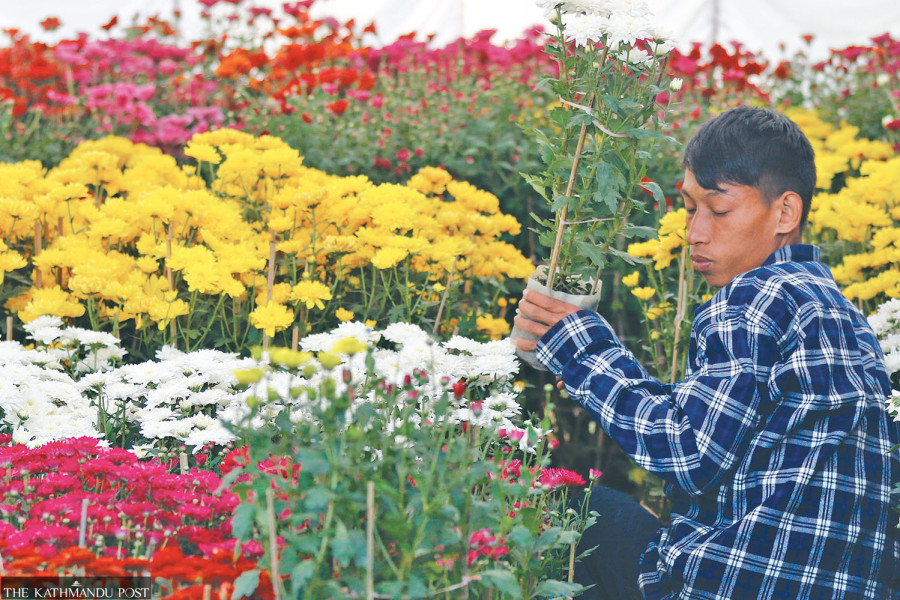Money
Economic slowdown hits restaurant business—and budding floriculture
Economists say that when over a million young people leave the country each year for jobs abroad, it affects consumption in all segments.
Sarahna Khadka
With growing urbanisation, the demand for indoor and outdoor flowers and plants in the Kathmandu valley made floriculture an emerging sector of business.
After the earthquakes of 2015, when land prices were largely stable, modern architectural designs of homes with larger windows and well-lit rooms made indoor gardening popular.
The floriculture business boomed as a result.
Then the Covid-19 pandemic hit the world, including Nepal, affecting the flower business, among other sectors.
But it did not take long for the flower business to make a dramatic upturn, with hundreds of nurseries opening in the Valley to meet the growing demand for flowering plants.
After the pandemic, hundreds of restaurants, bars and coffee shops appeared in a new avatar. They were innovative and stylish with floral décor solutions to attract customers.
Nurseries prospered.
Now, there is an economic slowdown, after the real estate business sputtered. With it, the flower business is down again.
“A few people visit us nowadays,” said Roshni Maharjan, proprietor at Hamro Bagaicha in Maitidevi.
Except for marigolds and chrysanthemums, which are in high demand in the festive season, nursery owners say the country’s economic slowdown has put the budding industry in tatters.
“Except in festival time, when we made up to Rs15,000 a day, the remaining months are slack,” said Maharjan.
Maharjan is concerned.
She, however, hopes that spring will bring people back.
Some flower varieties available in winter are Petunia, Calendula, Cineraria, Pancy, and Snapdragon.
In winter, nurseries are selling vegetable seeds and saplings to stay afloat.
Maharjan said that a growing number of her clients were professional gardeners and decoration service providers who buy indoor plants for their clients in hotels and residential spaces.
“They too have vanished.”
Bishal Nursery in Maharajgunj, which has been in the business for the last 35 years, has seen a significant drop in footfalls.
“Nowadays, we offer online services,” said Usha Khadka, owner of Bishal Nursery.
According to Khadka, during the Covid pandemic when lockdowns were enforced to stem the tide of new infections, they used social media platforms to attract customers.
“We did some business during the pandemic. After that, there was a shift in demand,” she said.
“Even clothing shops, corporate offices and interior designers approached us to order exotic perennial plants, which are expensive.”
Her nursery employs 10 people.
Khadka is too worried about the falling demand.
Then, the government started strictly monitoring the exotic plants. “The government has restricted the import of soil-based saplings from India,” Khadka told the Post.
“This is an ad-hoc decision made by the government, which has significantly impacted our business.”
According to Khadka, they now source most of the plants and flowers from the suppliers in the Tarai. “The government should have understood the impact of the ban. India is our main supplier.
It’s easy to import flowers and plants from India. The products are cheaper as well.”
“In the past years, most of our suppliers came to us with various offers and deals. That has stopped now,” said Khadka.
Mahesh Chandra Acharya, senior plant protection officer at the Plant Quarantine and Pesticide Management Centre, said that the import and export of soil-based plant saplings have been banned worldwide for a long time.
“Since Nepal did not properly implement the rule, soil-based plants were entering Nepal freely from India. There was smuggling as well—on a massive scale,” he said. “Now, the rules have been enforced as per the international quarantine protocols.”
He said that the soil of no other country can enter Nepal.
“However, if plants are sterilised or if plants are imported in coco pits, we allow them.”
According to the Floriculture Association Nepal, in the last fiscal year, Nepal imported 283.55 million saplings of various indoor and outdoor varieties of flowers and plants, a drop of 13.35 percent compared to the previous year.
The association has more than 751 flower nurseries, mostly located in Kathmandu Valley, registered with it. They provide jobs for more than 44,000 individuals. The annual turnover hovers at Rs2.3 billion.
Nurseries in the Kathmandu valley cater primarily to restaurants, bars, clubs and coffee shops that saw a boom after Covid as the government eased credit facilities to support the businesses hit by the pandemic.
The economic slowdown has affected them as well. Economists say that as over a million young people leave the country each year for foreign jobs, consumption has been curtailed.
“Youngsters were the customers of the restaurants, bars and coffee shops. And these eateries were also primarily driven by them,” said Pramod Jaiswal, former President of the Restaurant and Bar Association, who owns Mela Restaurant.
“Fresh graduates in the country became the owners of restaurants. And people who returned from abroad during the pandemic too invested in the restaurant business as they saw the industry secure and lucrative,” he said. Now there are more restaurants than needed as the industry saturates.
Araniko Rajbhandari, president of the Restaurant and Bar Association, said that the purchasing power of Nepalis has declined due to the economic slowdown and renewed political instability.
Nearly 40 percent of the total population of Nepal constitutes youth. There are two trends in the country for them—apply for foreign jobs or open restaurants, experts say.



 14.24°C Kathmandu
14.24°C Kathmandu















